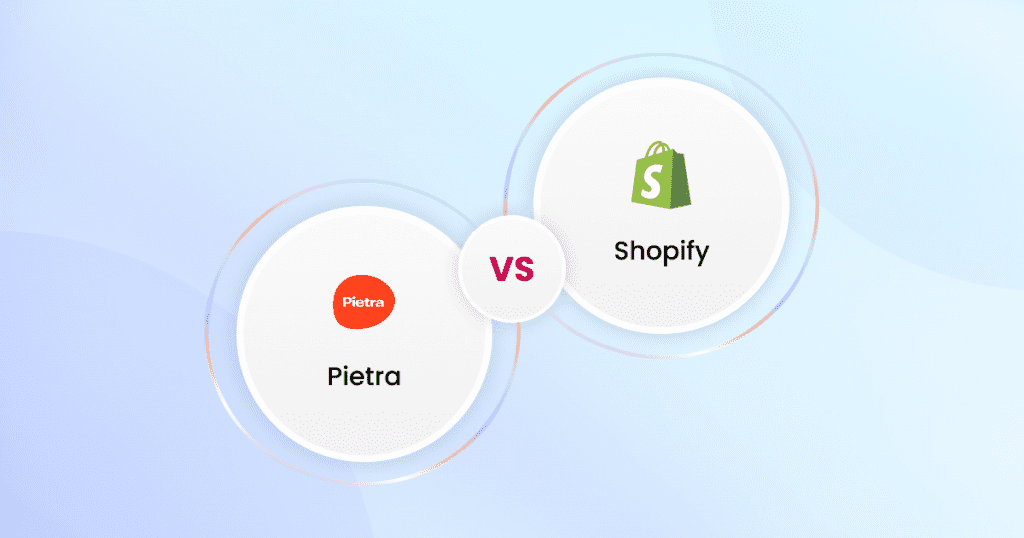Choosing the right ecommerce platform or ecommerce store is a crucial step for any small business, independent creator, or aspiring entrepreneur looking to launch an online store with reliable customer support solutions. Both shopify and pietra offer powerful features , including payment gateways and support for building a custom online store, but they cater to different needs and budgets. Pietra vs Shopify often comes up as a key choice for creators, small business owners, and entrepreneurs. With a range of tools for inventory tracking, marketing, and social media integration, each platform presents unique advantages that can influence your mobile commerce journey.
Shopify, known for its user-friendly interface and extensive app store, is a popular choice among ecommerce businesses globally. It’s designed to offer a comprehensive suite of tools—from adjustable layouts to advanced SEO capabilities and multi-channel selling options.
In this guide, we’ll explore Pietra vs. Shopify across key areas like more customization features , payment gateway, inventory oversight, and marketing capabilities. With so many options, finding the best e-commerce platform that suits your needs can make all the difference. By the end, you’ll have a clearer picture of which platform fits your business goals, whether it’s an extensive ecommerce platforms with complex needs or a streamlined setup for niche products. Let’s explore how Pietra vs Shopify stack up to help you make the best decision for your online store.
Platform Overviews
Pietra
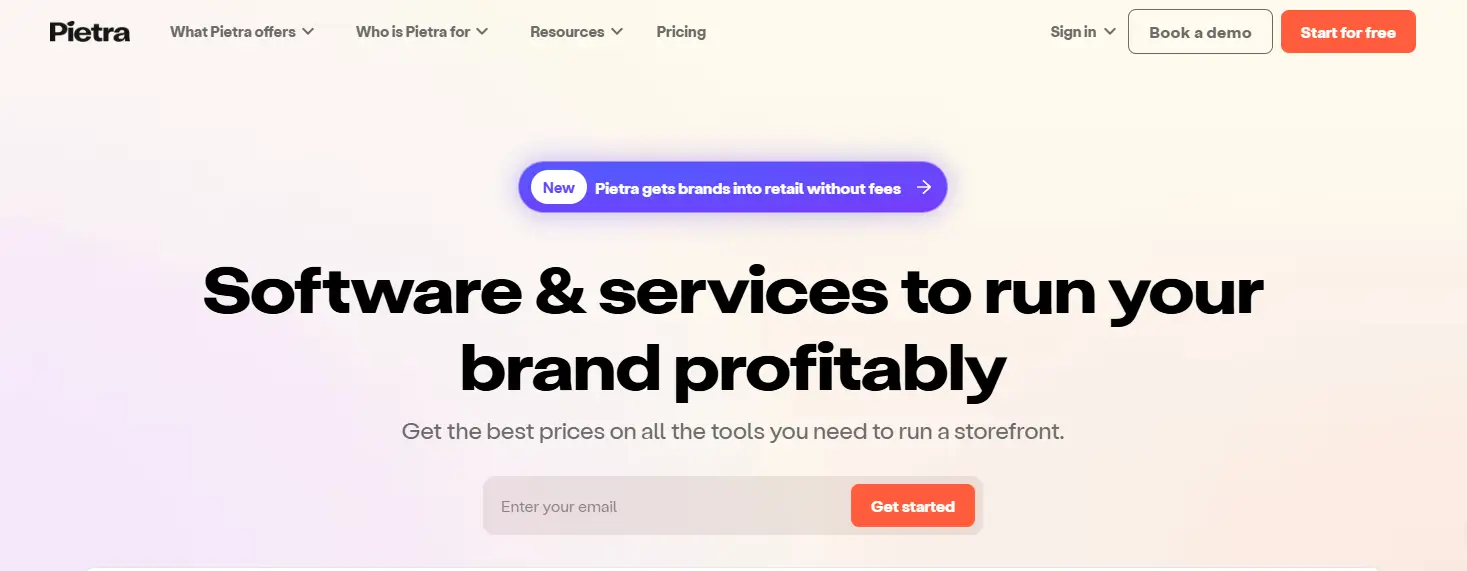
Pietra is an ecommerce platform designed specifically for creators and niche brands. Known for its unique combination of ecommerce platform functionality with supply coordination, Pietra simplifies the process for independent makers and small business owners. Pietra’s strengths lie in its built-in marketing tools, easy setup for small product collections, and logistic support, which includes secure invoicing, discounted shipping, and product management. These features help budget-conscious entrepreneurs reduce startup costs and focus on growing their brands. When comparing Pietra vs Shopify, Pietra’s core strength lies in its support for niche products, such as jewelry, art, or handmade goods. Pietra is a great option for niche brands wanting to launch an affordable ecommerce store that’s easy to manage and promote.
For creators looking to sell niche products, Pietra offers fewer personalization options than some competitors, but it compensates with straightforward tools to manage orders, communicate with customers, and oversee fulfillment. Pietra stands out as an e-commerce platform designed to simplify business operations for creators and small brands. The platform integrates with social media, making it easy for small brands to market directly to audiences on popular channels. With a focus on simplifying business operations, Pietra gives emerging brands the essentials to run a functional ecommerce platforms without needing extensive technical expertise. Pietra also simplifies the payment process by supporting essential payment gateways that suit small business needs.
Key Highlights of Pietra:
- Simple store website builder tailored to niche products
- Built-in marketing and user friendly SEO tools
- Discounted shipping and distribution support
- Communication management for customer interactions
- Ideal for smaller product ranges and boutique businesses
Shopify
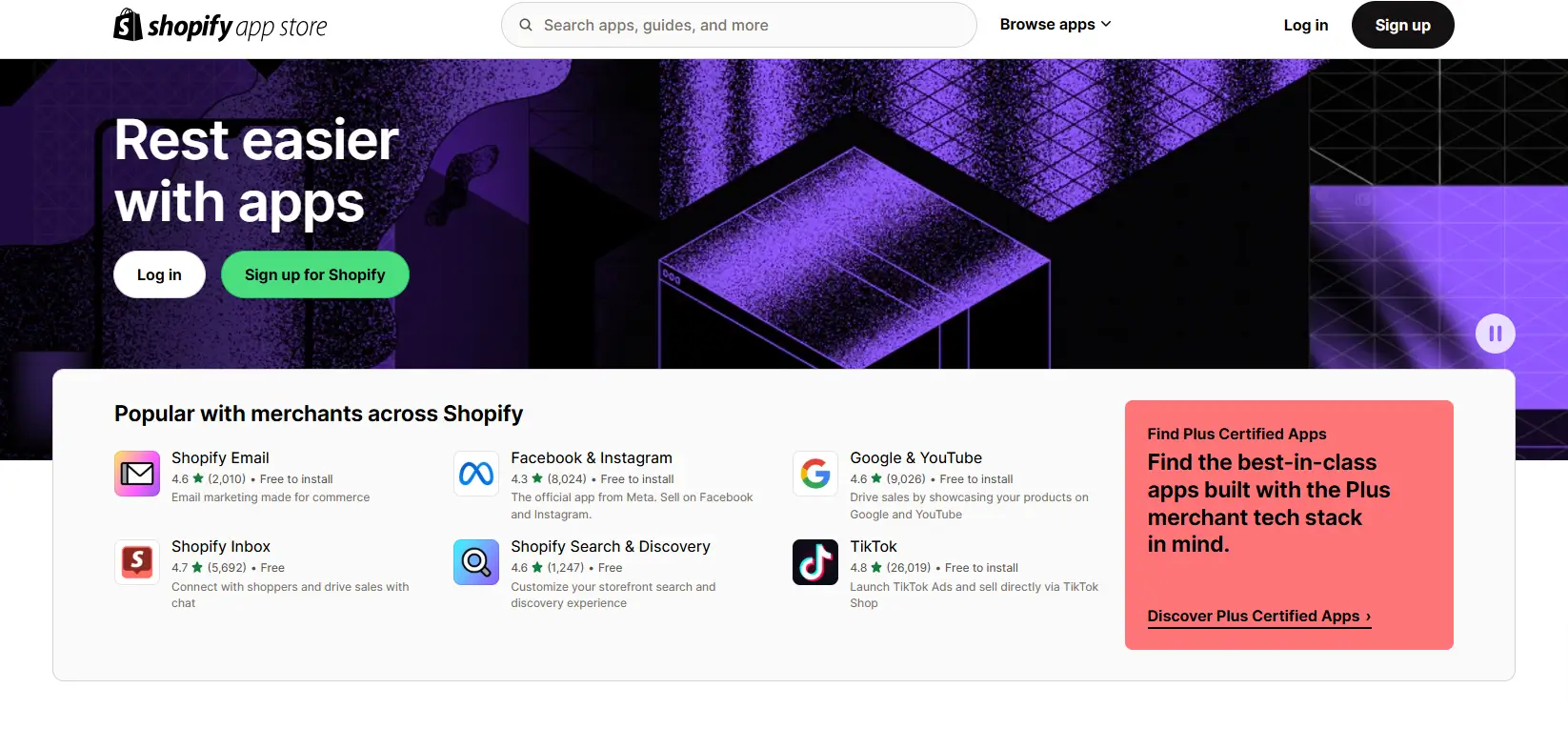
Shopify is one of the most widely-used ecommerce platforms, serving online store of all sizes. Known for its extensive app store and flexible templates, Shopify enables businesses to create advanced and personalized online store. It’s particularly suitable for entrepreneurs aiming for scalability, offering everything from basic store features to advanced sales tools and abandoned cart recovery. Pietra vs Shopify becomes a decision about depth and scale. Shopify’s extensive tools make it one of the best choices for building a scalable ecommerce store, from initial setup to advanced inventory monitoring.
Shopify’s platform provides a user-friendly interface with a robust inventory supervision system, which makes it versatile ecommerce platform for any entrepreneur, easier to track stock levels, manage orders, and streamline fulfillment. Shopify, on the other hand, is a versatile e-commerce platform built for scalability, supporting businesses of various sizes with advanced features for growth and market reach. The comprehensive app marketplace gives existing Shopify store access to a vast selection of third-party tools and plugins for added functionality, from email marketing to advanced SEO tools. Shopify’s extensive support includes phone support, giving users a quick way to get assistance when navigating setup, inventory regulation, or customizations.
One standout feature of Shopify is its Omni-channel sales capabilities, enabling business owners to sell across various social media platforms, integrate with marketplaces, and sync inventory seamlessly. Shopify Payments offers a straightforward payment gateway with minimal transaction fees, though it also supports other third-party payment gateway for businesses needing additional options. This platform’s flexibility and range of advanced store website builder features make it ideal for businesses that require more customization. Shopify Payments offers a straightforward payment gateways with minimal transaction fees, making it a flexible choice among payment gateways for businesses needing options.
Key Highlights of Shopify:
- Extensive shopify store for additional features
- Modifiable themes and advanced store builder
- Integrated Shopify Payments with minimal fees
- Cross-channel commerce across social media and marketplaces
- Advanced SEO and marketing tool for improved search engine visibility
Key Features Comparison
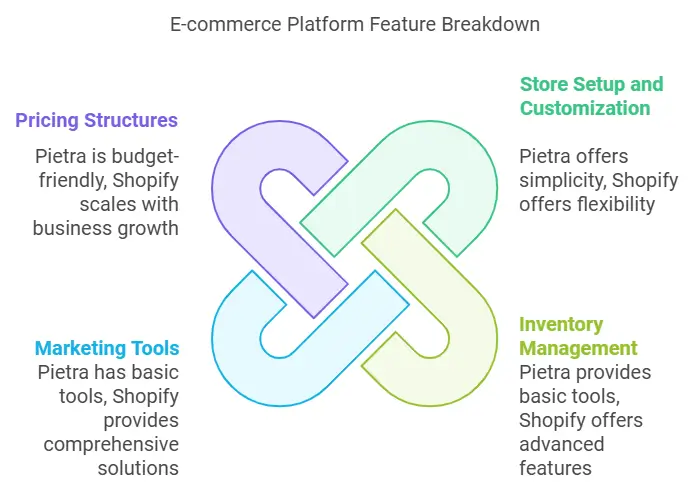
1. Store Setup and Customization Options
Pietra offers a straightforward setup designed for ease and simplicity, which is a big plus for creators and small business owners who don’t want to spend a lot of time customizing their existing stores. Pietra provides pre-designed templates that allow users to create ecommerce platform functionality to store quickly, though it offers fewer design flexibility compared to Shopify. This makes Pietra ideal for niche businesses and creators who prefer a simple, user-friendly interface without requiring extensive technical skills. When it comes to Pietra vs Shopify for store customization, Shopify offers far more options. Pietra’s store builder, while simpler, offers a solid foundation for those who want a basic e-commerce platform setup that can be launched quickly.
Shopify, in contrast, is highly customizable and flexible. With access to a vast library of adaptable layouts and an advanced store builder, Shopify allows users to build unique, branded online stores that cater to diverse business needs. From product pages to checkout experiences, Shopify’s personalization features are nearly endless, making it ideal for entrepreneurs looking to differentiate their existing stores and appeal to specific audiences. The extensive app store further enhances this customization, allowing users to add everything from loyalty programs to advanced sales features.
2. Inventory Management and Order Fulfillment
For inventory management, Pietra keeps things simple, offering a streamlined approach suited for businesses with limited product ranges. Pietra includes basic inventory management tools to help small businesses monitor stock and fulfill orders efficiently. Paired with Pietra’s shipping discount options and Supply management, this platform can handle the essentials, but it may lack the depth needed by larger, more complex businesses. Inventory management is essential for e-commerce success, and this is another area where Pietra vs Shopify brings out stark contrasts.
Shopify’s inventory management capabilities are more comprehensive, providing advanced tools for tracking stock levels, organizing products, and even managing variations within the same product line. Shopify’s abandoned cart recovery and sales analytics allow businesses to monitor customer behavior, recover potential lost sales, and gain insights into what’s driving purchases. Shopify’s logistics integrations support both in-house and third-party fulfillment options, catering to growing businesses that need more scalability.
3. Marketing Tools and Integrations
Marketing tools are crucial for any emcommerce business, and Pietra’s built-in marketing features focus on helping creators reach their audiences effectively. Pietra supports social media integration, allowing businesses to connect directly with their followers. Additionally, Pietra offers some basic SEO tools and email marketing support, making it accessible for smaller brands looking to reach their target audience without a complex marketing strategy. Marketing services are vital to any ecommerce platform.
Shopify, however, provides a more comprehensive suite of marketing and SEO tools. With a focus on driving traffic from search engines, Shopify includes advanced SEO capabilities, customizable meta descriptions, and blogging tools to support content marketing strategies. Shopify’s integrations extend to popular marketing platforms and social media, with options for running ads, creating discount codes, and even utilizing customer behavior insights to fine-tune marketing strategies. Comparing Pietra vs Shopify for marketing capabilities, Pietra provides social media integration and basic SEO tools, making it easier for creators to reach their followers. These tools make Shopify a better choice for businesses with more advanced marketing needs.
4. Pricing Structures and Additional Costs
Pietra’s pricing plans are designed to be accessible for small businesses and creators. The platform’s pricing generally includes core features without hidden fees, making it easier for budget-conscious entrepreneurs to plan their expenses. Pietra offers lower transaction fees compared to many ecommerce platforms, which can be an attractive point for businesses selling lower-cost or niche products. Pietra vs Shopify also differs in pricing models. Pietra’s budget-friendly payment options make it an affordable option for setting up an ecommerce store without high upfront costs.
Shopify, while pricier in some cases, provides several fee structures that scale with business growth. Starting with a Basic Plan, Shopify allows businesses to choose a level that matches their requirements, from small startups to larger e-commerce platforms. Shopify also includes transaction fees, though these can be reduced or eliminated if using Shopify Payments. Although Shopify may incur additional costs for plugins or Specialized features, it delivers significant value for businesses looking to grow. Although Shopify may incur additional fees, the investment can benefit businesses aiming to scale their own ecommerce store.
Pros and Cons
Pietra

Pros:
- User-Friendly Setup: Pietra’s simple store builder allows for quick setup, making it easy for small businesses and creators to launch an e-commerce store without technical expertise. Pietra is an affordable, user-friendly ecommerce platform with a focus on niche brands
- Built-In Marketing and distribution support: Pietra provides essential marketing tools, including social media integration and basic SEO capabilities, along with discounted delivery and invoicing support. Pietra’s lower-cost payment gateways options are ideal for creators who want an affordable setup.
- Affordable for Small Businesses: With lower transaction fees and straightforward subscription plans, Pietra is a budget-friendly option, ideal for niche businesses with small product ranges.
- Targeted for Creators and Niche Products: Pietra’s platform is tailored for independent makers and small businesses with unique, niche products, making it ideal for boutique ecommerce stores.
Cons:
- Limited Customization Features: Pietra offers fewer custom setup choices, which may be restrictive for brands looking to create a unique, highly personalized online presence.
- Fewer Advanced Features: For businesses needing advanced e-commerce features, such as abandoned cart recovery or extensive app integrations, Pietra might feel limited.
- Less Support for Scaling Up: Pietra’s tools are great for small startups, but businesses with growing inventory or more complex fulfillment needs might find the platform less scalable.
Shopify
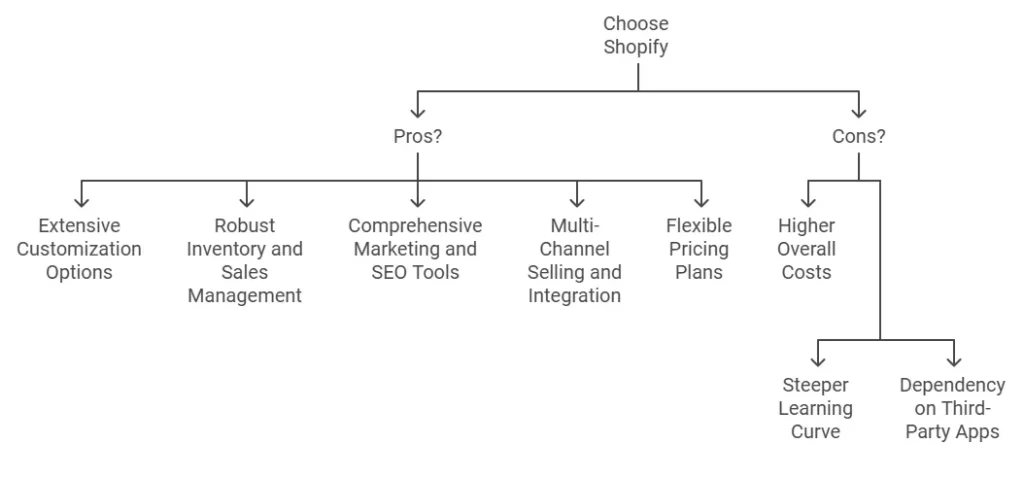
Pros:
- Extensive Customization Options: Shopify’s customizable templates and more advanced store builder allow businesses to create a unique and professional online store, ideal for brand differentiation.
- Robust Inventory and Sales Management: With advanced plugins inventory management, sales reporting, and abandoned cart recovery, Shopify supports more sophisticated business needs, providing tools for scaling up.
- Comprehensive Marketing and SEO Tools: Shopify’s suite of marketing tool, from SEO abilities to social media marketing and email marketing, helps businesses drive traffic and increase visibility on search engine.
- Multi-Channel Selling and Integration: Shopify enables businesses to sell across multiple platforms, from social media to marketplaces, creating a seamless multi-channel experience for growing brands.
- Flexible Pricing Plans: Shopify offers a range of pricing packages that accommodate businesses at different stages, from basic plan for small startups to more advanced options for established stores. Shopify’s strengths as an ecommerce platform lie in its customization and scalability.
Cons:
- Higher Overall Costs: Shopify’s pricing, especially with additional plugins and third-party apps, can become costly for businesses with tighter budgets. Transaction fees may also apply if not using Shopify Payments.
- Steeper Learning Curve: Although Shopify is user-friendly, its wide range of features and modification settings may feel overwhelming for beginners or small business owners without technical competence.
- Dependency on Third-Party Apps: While Shopify’s app marketplace offers extensive options, many robust features require third-party apps, which can lead to additional costs and complexity in managing the store.
Suitability for Different Business Models
Small Businesses and Budget-Conscious Entrepreneurs
For small businesses and budget-conscious entrepreneurs, Pietra often stands out as the more practical choice. Its lower transfer fees, affordable pricing plans, and basic features make it a suitable platform for businesses with smaller budgets or simpler needs. Pietra’s focus on user-friendliness and straightforward fulfillment services is appealing to entrepreneurs who prefer to keep startup costs low and manage a limited product range without investing in additional third-party tools. For small businesses looking to start with minimal investment, Pietra vs Shopify often comes down to budget. Pietra’s simple yet effective e-commerce solutions are perfect for creators needing basic tools to launch a niche brand quickly.
However, for small businesses expecting to grow their online stores over time or those needing more advanced marketing and sales features, Shopify may be a better long-term investment. Shopify’s flexible pricing plans allow small businesses to start with a basic setup and gradually scale up, adding advanced features as needed. Although Shopify requires a higher initial investment, its extensive adaptable elements and app integrations can be a significant advantage for growth-oriented businesses.
Independent Creators and Makers
Independent creators, artists, and boutique brands who prioritize a straightforward platform with basic marketing tools will likely find Pietra to be a strong match. Pietra’s platform is designed with creators in mind, offering social media integration, secure invoicing, and basic SEO tool to help them establish a presence without needing technical understanding. Creators who rely on social media to drive sales may find Pietra’s integration with social channels a useful feature, simplifying their workflow.
For creators who want a more customized online store or plan to expand their product offerings, Shopify offers more flexibility and customization features. Shopify’s extensive app store and high-level store builder allow independent creators to design a unique brand experience and build stronger connections with their customers. The platform’s scalability and Multi-outlet sales options also give creators room to expand their reach across various platforms and marketplaces. However, if the goal is to build a branded, customized store, Shopify’s versatility gives it the edge in Pietra vs Shopify comparisons for independent makers.
Retail Startups with Niche Products
Retail startups focusing on niche products, such as handmade items, eco-friendly products, or custom designs, may appreciate Pietra’s streamlined approach. Pietra’s platform suits niche businesses that don’t need complex functionality but want basic inventory management and customer communication features. Additionally, Pietra’s logistic support is helpful for businesses aiming to manage product fulfillment and shipping affordably. Pietra vs Shopify can also come down to niche product needs.
That said, Shopify’s Pro-level tools make it a great choice for niche businesses looking to scale their operations and reach a broader audience. Shopify’s branding choices, social media marketing tools, and payment gateway flexibility are advantageous for retail startups aiming to create a strong brand identity and grow beyond a limited customer base. The platform’s support for Cross-platform sales also makes it easier for niche businesses to expand into new markets and sales channels.
E-Commerce Businesses Needing Advanced Tools
For businesses that require advanced e-commerce tools and aim to compete on a larger scale, Shopify is likely the better choice. Its platform supports a wide range of premium tools, including Cart abandonment recovery, sales analytics, extensive app integrations, and customizable templates, which are valuable for larger businesses or those with complex needs. Each e-commerce platform is suited to specific business models, so let’s look at how Pietra and Shopify cater to small businesses, creators, and e-commerce startups. Shopify’s built-in marketing and SEO tool can also help ecommerce business drive traffic and boost visibility on search engines, supporting a long-term growth strategy.
Pietra may not offer the same level of scalability or advanced tools required by more complex ecommerce business. While it’s ideal for smaller or simpler operations, businesses that rely heavily on detailed analytics, automated marketing campaigns, or complex inventory management will find Shopify better suited to their needs. For businesses that require advanced tools, Pietra vs Shopify tips in Shopify’s favor.
Case Studies or Examples
Example 1: A Handmade Jewelry Brand Using Pietra
Sarah, an independent jewelry maker, wanted a straightforward way to sell her products online without investing too much time or money in complex e-commerce features. With a small collection of handmade pieces, she chose Pietra to create a simple and affordable online store that connected seamlessly with her social media profiles.
Pietra’s built-in marketing tools allowed Sarah to promote her jewelry on social media platforms, reaching her followers and expanding her customer base without a complicated setup. The platform’s logistics support and cost-effective shipping options helped her streamline her order fulfillment, and its basic inventory management allowed her to track stock levels easily. Pietra’s lower transaction costs also made it easier for Sarah to maximize her profit margins on each sale, a significant advantage for a small, niche brand.
Sarah’s business grew steadily, and while she considered transitioning to a more customizable platform later, Pietra gave her an accessible way to start her e-commerce journey without needing extensive digital skills. For her, Pietra vs Shopify came down to simplicity and cost.
Example 2: A Boutique Clothing Store Growing with Shopify
Michael launched a boutique clothing line featuring eco-friendly and ethically sourced materials. He needed an ecommerce platform that would allow for a unique, branded shopping experience and provide scalability as his product range expanded. Shopify was an ideal choice for Michael because of its robust personalization features and advanced inventory management tools.
With Shopify’s customizable templates and dynamic store creator, Michael created a distinctive online store that reflected his brand’s values and aesthetic. He used Shopify’s commercial and SEO tools to drive organic traffic from search engines and connected with his audience on social media through multi-point distribution. As his business grew, Michael took advantage of Shopify’s app marketplace to add functionality, including email marketing, customer loyalty programs, and sales analytics.
Shopify’s scalable platform allowed Michael to increase his product range without outgrowing the platform. As he added more products and began expanding his reach into other markets, Shopify’s enhanced functionalities supported his business’s needs every step of the way. For a business looking to scale and build a lasting brand, Shopify’s comprehensive features made it the right choice. For him, Pietra vs Shopify wasn’t about simplicity but about brand-building.
Example 3: An Online Art Store Using Pietra for Affordable Sales
Jenna, a painter selling original artwork and prints, wanted an online store that was easy to set up and maintain without high monthly costs. With a small collection and a focus on direct sales through social media, she chose Pietra. The platform’s lower Payment fees and built-in social media sync allowed her to market her art affordably and manage her orders directly.
Pietra’s user-friendly interface allowed Jenna to set up her store quickly, and the platform’s logistics support made it easy for her to handle shipping and secure invoice. Since she mainly relied on her existing social media following to drive traffic, Pietra’s streamlined design and affordable pricing plan fit her needs perfectly. Jenna continues to enjoy the simplicity Pietra provides, helping her maintain a steady income from her art sales without needing to navigate complex tools.
Frequently Asked Questions (FAQs)
1. Which platform is better for small businesses: Pietra or Shopify?
- Pietra is generally more budget-friendly for small businesses with limited product ranges, thanks to its lower Service charges and simple features. Shopify, while potentially costlier, offers more tools for businesses expecting to grow and scale over time.
2. Do I need technical knowledge to use these platforms?
- No. Both Shopify and Pietra are user-friendly and designed for people without technical experience. Pietra is especially beginner-friendly, while Shopify has a larger learning curve but offers more advanced customization options.
3. Can I sell on social media with Pietra and Shopify?
- Yes, both platforms support social media connectivity. Pietra focuses on straightforward social media connections, while Shopify offers extensive multi-platform selling options across various platforms, including social media marketplaces.
4. Which platform has better SEO and marketing tools?
- Shopify provides more comprehensive SEO and marketing tools, including customizable meta tags, blogging capabilities, and various marketing integrations. Pietra includes essential tools but may be more limited for businesses with advanced marketing needs.
5. Are there hidden fees on either platform?
- Both platforms have transparent pricing structures, but Shopify may incur additional costs for plugins and processing fees if not using Shopify Payments. Pietra has lower transaction fees and fewer hidden costs, making it ideal for budget-conscious entrepreneurs.
Conclusion
Choosing between Pietra and Shopify comes down to understanding your business’s unique needs, budget, and growth plans. Pietra is ideal for small businesses, independent creators, and budget-conscious entrepreneurs who want an easy-to-use, affordable platform with basic e-commerce and logistics features. It’s a solid choice for niche businesses that don’t require extensive customization or advanced marketing tools. Choosing Pietra vs Shopify is ultimately about understanding your specific needs and goals. The decision between Shopify vs Pietra ultimately depends on your business’s needs, budget, and growth aspirations.
On the other hand, Shopify provides a powerful, scalable platform with robust customization options, omni-channel sales, and an extensive application store that supports businesses of all sizes. It’s designed for those who need a more flexible, customizable, and more premium store builder to scale their brand and reach a larger audience. Whether it’s a straightforward store setup or a fully customized online presence, Pietra vs Shopify offers distinct advantages. Whichever option you choose, both platforms have the potential to support your functional ecommerce store and help you achieve your business goals.
If your goal is to create a simple, functional store without extensive technical knowledge, Pietra may be the best fit. But if you’re aiming to build a distinctive online presence with room to grow, Shopify’s expanded tools and comprehensive support will serve you well. Both platforms have their strengths, so consider your budget, target audience, and long-term goals to make the choice that aligns best with your e-commerce vision.
